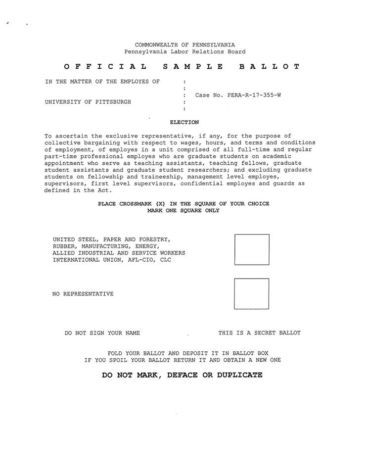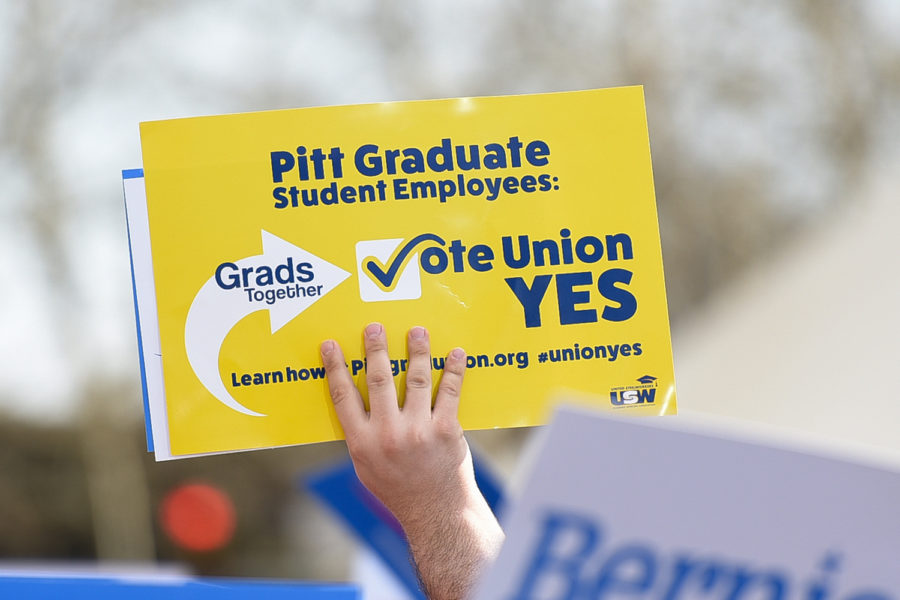After years-long campaign, grad students await outcome of union vote
Anna Bongardino | Contributing Editor
The Pitt graduate student union election results were announced on April 26.
April 18, 2019
Organizers wearing pro-union T-shirts high-fived and cheered for the last few dozen graduate students as they trickled into the second-floor ballroom of the O’Hara Student Center Thursday afternoon to cast their votes in the union election.
They were celebrating the culmination of a years-long campaign to unionize Pitt graduate students — although the results of the election won’t be announced until next Friday. Despite roadblocks and perceived opposition from the University, organizer and Pitt graduate student Kim Garrett said she was hopeful about the results of the election.
“This four-year-long battle is almost over,” Garrett said. “I’m optimistic we turned out enough people to form a union.”
More than 1,000 students voted in the graduate student union election held this week in Posvar and the O’Hara Student Center, just five weeks after the Pennsylvania Labor Relations Board ruled that graduate students at Pitt are allowed to unionize.
According to Dennis Bachy, a PLRB agent who oversaw the voting process, Pitt turned out an estimated 60-70% — approximately 1,200 to 1,400 — of its eligible 2,017 voters. The PLRB will likely provide an exact number Friday, Bachy said.

Masters physics student Karan Kapoor said he voted “yes” because he wanted graduate students to have more sway when negotiating with University administration.
“It’s about having representation,” Kapoor said. “If the University has all the control, they can do whatever they want with our contracts.”
Graduate students like Sih-ting Cai, who’s earning her doctorate in public health and policy, said she wants a union to negotiate a more flexible budget in her department.
“[My department] is limited to a very tight budget … a lot of the money we use to go to conferences, which are necessary to display our research and work, we have to pay out of pocket,” Cai said. “That’s one of the many things we could negotiate for [with a union].”
Cai said she learned about the union only a few weeks ago after the PLRB ruled graduate students could unionize, and organizers began sending out emails.
Lead United Steelworkers organizer Jeff Cech said he and his colleagues at USW and Pitt have been working round the clock contacting eligible voters and informing them about how a union could improve their lives.
“After the ruling, we have tried to reach people through social media, using email, even calling people if we have their [phone] numbers,” Cech said. “We even sent out a troupe of canvassers to knock on doors — not unlike a political campaign.”
Garrett’s optimistic that enough graduates voted to form a union at Pitt. She said as of Wednesday night, organizers believed they had confirmed at least 700 “yes” votes, with one day of voting still to come.
But according to Cech, the University could still contest the union if it files an appeal to the PLRB’s ruling from March, which granted Pitt graduate students the right to unionize.
“I hope they’ll respect the rights of graduate students here and not drop hundreds of thousands more [dollars] in tuition money on legal fees,” Cech said. “I’ll be honest, I’m not sure if they will or not.”
University spokesperson Joe Miksch declined to say whether the University would appeal the PLRB’s decision, but he said the best approach to addressing graduate students’ concerns is through “direct dialogue” with the University, not by bringing a “third-party” to the negotiating table.
“The United Steelworkers has no experience representing any graduate students in an academic setting in the United States,” Miksch said.
Miksch also emphasized repeatedly that the University has made no attempt to obstruct the graduate student election. He said the University has provided extra shuttle bus services and posted signs directing graduate students to voting locations.
But Cech claimed the University has made its position clear since the PLRB ruling, spreading “anti-union propaganda” through emails, fliers and an FAQ posted to its website.
“I’m really disappointed in the University for their behavior this week,” Cech said. “But the worst of it’s over. We lose, we’re just gonna keep organizing, and if we win, we’re gonna start bargaining right away.”
Paul Justice, who voted “yes” to the union on Thursday, has followed the union effort since its inception. He said he was initially on the fence about voting because he’s defending his dissertation next month and won’t get to reap the benefits of a graduate student union. But Justice changed his mind.
“I didn’t want to cast a lame-duck vote,” he said. “But eventually I realized that a union benefits everyone, and I wanted to vote ‘yes’ for grads who come after me.”








